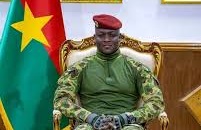
Burkina Faso Rejects U.S. Proposal to Accept Deported Migrants, Asserts National Dignity
Ouagadougou, Burkina Faso – October 10, 2025
Burkina Faso has formally refused a request from the U.S. government to accept migrants being deported under President Donald Trump’s latest immigration crackdown, specifically those sent to third countries with which they have no ties.
Foreign Minister Karamoko Jean-Marie Traoré denounced the proposal as “indecent” and said it was fundamentally “contrary to the principle of dignity.” He declared Burkina Faso “a land of dignity, a destination, not a place of expulsion.”
Traoré’s rejection came shortly after the U.S. Embassy in Ouagadougou suspended most visa services for Burkinabé residents, redirecting them to the U.S. Embassy in Lomé, Togo. Many in Burkina Faso view this move as a “pressure tactic” or diplomatic coercion aimed at securing compliance with U.S. demands.
Under the policy being proposed by Washington, migrants, including non-citizens of the destination state would be deported to countries that have agreed to receive them, even if they have no familial, cultural, or legal connection to those nations. Burkina Faso’s refusal is among the strongest responses yet from an African state being courted by the U.S. for these arrangements.
Observers see this stance as consistent with Burkina Faso’s recent quest for robust sovereignty, refusal of perceived neo-colonial pressure, and its posture under the military leadership of Captain Ibrahim Traoré. The government’s defense of national dignity is in line with its broader narrative of being independent, not subservient, in its foreign policy.
According to Leadership Nigeria, officials in Ouagadougou view Washington’s request as an insult to the Burkinabè people, arguing that a nation that has endured years of insecurity and displacement should not be asked to house deportees from another continent.
Across the Sahel, analysts and civil society organizations have hailed Burkina Faso’s stance as a “defining moment of African dignity.” Political commentator Dr. Oumar Zoundi, writing for Le Faso, said, “Burkina Faso’s refusal sends a strong message that Africa is no longer willing to absorb the consequences of Western policy failures.”
African critics have expressed concern that the U.S. proposal could set a dangerous precedent, effectively outsourcing its migration crisis to African nations.
Human rights organizations have weighed in, especially targeting the secrecy and conditions tied to the broader U.S. deportation strategy. Human Rights Watch criticized the U.S. for offering financial incentives to participating nations, revealing agreements by which Eswatini would receive $5.1 million and Rwanda $7.5 million in support of migration and border management efforts.
Similarly, Amnesty International has publicly criticized agreements between the U.S. and African nations for deporting migrants, notably calling the U.S.-Rwanda deal “contrary to the Refugee Convention” because of risks of refoulement and flaws in the asylum process.
In the words of Minister Traoré, Burkina Faso “will not trade human dignity for diplomatic favors.” The statement resonates deeply within a region still grappling with the long shadow of colonialism and the modern pressures of Western interventionism.
As Burkina Faso continues to position itself as a voice of defiance in Africa’s new geopolitical order, its latest refusal underscores a simple but powerful message: that sovereignty cannot be negotiated, and dignity is not for sale.